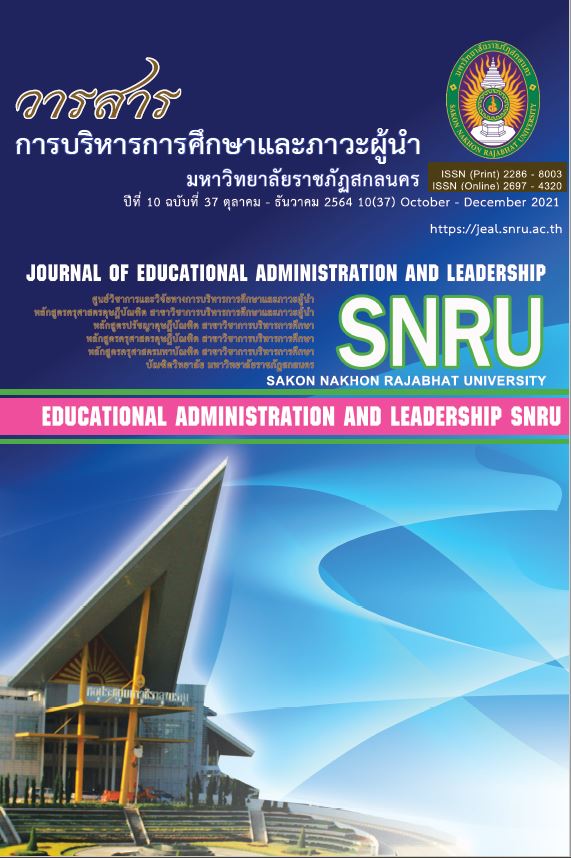

ภาวะผู้นำทางวิชาการของผู้บริหารสถานศึกษาที่ส่งผลต่อประสิทธิผลการบริหารงานวิชาการ ของโรงเรียนสังกัดสำนักงานเขตพื้นที่การศึกษามัธยมศึกษา เขต 21
Instructional Leadership of School Administrators Influencing the Effectiveness of Academic Affairs Administration in Schools under the Secondary Educational Service Area Office 21
ผู้แต่ง
ปวีณา บุทธิจักร์, วัฒนา สุวรรณไตรย์, จินดา ลาโพธิ์
Author
Paweena Buttijak, Watana Suwannatrai, Jinda Lapho
บทคัดย่อ
การวิจัยครั้งนี้มีความมุ่งหมายเพื่อศึกษาและเปรียบเทียบภาวะผู้นำทางวิชาการของผู้บริหารสถานศึกษาและประสิทธิผลการบริหารงานวิชาการ หาความสัมพันธ์และค่าอำนาจพยากรณ์ระหว่างภาวะผู้นำทางวิชาการของผู้บริหารสถานศึกษา ที่ส่งผลต่อประสิทธิผลการบริหารงานวิชาการของโรงเรียนสังกัดสำนักงานเขตพื้นที่การศึกษามัธยมศึกษา เขต 21 กลุ่มตัวอย่างประกอบด้วย ผู้บริหารสถานศึกษา และครูผู้สอน ในโรงเรียนสังกัดสำนักงานเขตพื้นที่การศึกษามัธยมศึกษา เขต 21 ปีการศึกษา 2563 จำนวน 335 คน ได้มาโดยการสุ่มแบบหลายขั้นตอน จำแนกเป็น ผู้บริหารสถานศึกษา จำนวน 56 คน และ ครูผู้สอน จำนวน 279 คน เครื่องมือที่ใช้ในการเก็บข้อมูลเป็นแบบสอบถามมาตรส่วน ประมาณค่า 5 ระดับ 2 ด้าน คือ ด้านที่ 1 ภาวะผู้นำทางวิชาการของผู้บริหารสถานศึกษา มีค่าความเชื่อมั่น .990 ด้านที่ 2 ประสิทธิผลการบริหารงานวิชาการของโรงเรียน มีค่าความเชื่อมั่น .980 สถิติที่ใช้ในการวิเคราะห์ข้อมูล คือ ค่าร้อยละ ค่าเฉลี่ย ค่าเบี่ยงเบนมาตรฐาน ทดสอบสมมติฐานโดยใช้การวิเคราะห์แบบ t-test, F-test (One-way ANOVA) ค่าสหสัมพันธ์อย่างง่ายของเพียร์สัน (Pearson’s Product-Moment Correlation) และการวิเคราะห์การถดถอยพหุคูณแต่ละขั้นตอน (Stepwise multiple regression analysis)
ผลการวิจัย พบว่า
1. ภาวะผู้นำทางวิชาการของผู้บริหารสถานศึกษา และประสิทธิผลการบริหารงานวิชาการของโรงเรียนตามความคิดเห็นของผู้บริหารและครูผู้สอน อยู่ในระดับมาก
2. ภาวะผู้นำทางวิชาการของผู้บริหารสถานศึกษา ตามความคิดเห็นของผู้บริหารและครูผู้สอน โดยรวมมีความแตกต่างกันอย่างมีนัยสำคัญทางสถิติที่ระดับ .01 ส่วนประสิทธิผลการบริหารงานวิชาการ โดยรวม ไม่แตกต่างกัน
3. ภาวะผู้นำทางวิชาการของผู้บริหารสถานศึกษา และประสิทธิผลการบริหารงานวิชาการ ตามความคิดเห็นของผู้บริหาร และครูผู้สอน จำแนกตาม ประสบการณ์ในการทำงาน โดยรวมและรายด้าน ไม่แตกต่างกัน
4. ภาวะผู้นำทางวิชาการของผู้บริหารสถานศึกษา และประสิทธิผลการบริหารงานวิชาการ ตามความคิดเห็นของผู้บริหาร และครูผู้สอน จำแนกตาม ขนาดของโรงเรียน โดยรวมแตกต่างกันอย่างมีนัยสำคัญทางสถิติที่ระดับ .01
5. ภาวะผู้นำทางวิชาการของผู้บริหารสถานศึกษา และประสิทธิผลการบริหารงานวิชาการ ตามความคิดเห็นของผู้บริหาร และครูผู้สอน จำแนกตามจังหวัดที่ตั้งของโรงเรียน โดยรวมแตกต่างกันอย่างมีนัยสำคัญทางสถิติที่ระดับ .01
6. ภาวะผู้นำทางวิชาการของผู้บริหารสถานศึกษาและประสิทธิผลการบริหารงานวิชาการ มีความสัมพันธ์กันในทางบวกอย่างมีนัยสำคัญทางสถิติที่ระดับ .01
7. ภาวะผู้นำทางวิชาการของผู้บริหารสถานศึกษา และด้านการนิเทศการศึกษา ด้านการพัฒนาหลักสูตรและการเรียนการสอน ด้านการพัฒนานักเรียน และด้านการพัฒนาวิชาชีพครูและบุคลากร มีอำนาจพยากรณ์ประสิทธิผลการบริหารงานวิชาการ โดยรวมอย่างมีนัยสำคัญทางสถิติที่ระดับ .01 มีอำนาจพยากรณ์ประสิทธิผลการบริหารงานวิชาการ ร้อยละ 64.40 และมีความคลาดเคลื่อนมาตรฐานของการพยากรณ์ เท่ากับ ±.23458
8. แนวทางการพัฒนาภาวะผู้นำทางวิชาการของผู้บริหารสถานศึกษา 4 ด้าน ได้แก่ 1) การพัฒนาหลักสูตรและการเรียนการสอน ควรมีการวิเคราะห์หลักสูตรแกนกลาง กำหนดจุดมุ่งหมายของหลักสูตรสถานศึกษาให้สอดคล้องกับความต้องการของผู้เรียนและชุมชน วางแผนเตรียมความพร้อมให้กับครูในการนำหลักสูตรไปใช้ในการจัดการเรียนการสอน 2) การพัฒนานักเรียน ผู้บริหารต้องติดตามความก้าวหน้าของนักเรียน และส่งเสริมให้ครูนำเสนอพัฒนาการเรียนรู้ของนักเรียน มีการดำเนินการยกระดับผลสัมฤทธิ์ทางการเรียนของนักเรียนร่วมมือกับผู้ปกครองนักเรียน 3) การพัฒนาวิชาชีพครูและบุคลากร ผู้บริหารควรมี สนับสนุนให้ครูเข้าร่วมกิจกรรมพัฒนาวิชาชีพครู ซึ่งเป็นกิจกรรมที่สอดคล้องกับเป้าประสงค์ของโรงเรียน 4) การนิเทศการศึกษา ผู้บริหารต้องสร้างขวัญและกำลังใจแก่ครูและบุคลากรจัดอบรมเพื่อให้เกิดทักษะแก่บุคลากรในสถานศึกษา
Abstract
The purposes of this research aimed to study and compare instructional leadership of school administrators and the effectiveness of school academic affairs administration, to examine the relationship and the predictive power of academic affairs administration influencing the effectiveness of academic affairs administration in schools under the Secondary Educational Service Area Office 21 (SESAO). The sample, obtained through proportional stratified random sampling, consisted of 56 school administrators, and 279 teachers, yielding a total of 335 participants from schools under the SESAO 21 in the academic year 2020. The instrument for data collection was a set of rating scale questionnaires containing two parts: Parts 1-instructional leadership of school administrators with a reliability of .990; Parts 2- effectiveness of school academic affairs administration with a reliability of .980. Statistics for data analysis were percentage, mean, and standard deviation. The hypothesis tasting was done through t-test, One-Way ANOVA, Pearson’s product-moment correlation, and Stepwise multiple regression analysis.
The findings were as follows:
1. Instructional leadership of school administrators and the effectiveness of school academic affairs administration, as perceived by participants, was at a high level.
2. Overall instructional leadership of school administrators, as perceived by participants, differed at the .01 level of significance, whereas the overall effectiveness of school academic affairs administration was not different.
3. Instructional leadership of school administrators and the effectiveness of school academic affairs administration, as perceived by participants, classified by work experience, as a whole and in each aspect, were not different.
4. Instructional leadership of school administrators and the effectiveness of school academic affairs administration, as perceived by participants from different school sizes as a whole were at the .01 level of significance.
5. Instructional leadership of school administrators and the effectiveness of school academic affairs administration, as perceived by participants from different province of school location, as a whole were at the .01 level of significance.
6. Instructional leadership of school administrators and the effectiveness of school academic affairs administration had a positive relationship at the .01 level of significance.
7. Instructional leadership of school administrators in terms of educational supervision, curriculum and instruction development, student development, and professional development of teachers and personnel had the predictive power on the effectiveness of school academic affairs administration of 64.40 percent at the .01 level of significance with the standard error estimate of ±.23458.
8. The guidelines for developing instructional leadership of school administrators involved four aspects: 1) Curriculum and instruction development by analyzing the core curriculum to set the objectives of school curriculums in accordance with the needs of learners and community, and plan for preparing teachers to implement the curriculums into practice; 2) Student development by monitoring student progress, supporting teachers to present students’ learning progress, and working collaboratively with parents to improve students’ learning achievement; 3) Professional development of teachers and personnel by supporting teachers to participate in professional development activities in relation to the schools’ goals, 4) Educational supervision by creating morale for teachers and personnel and providing workshops to improve school personnel skills.
คำสำคัญ
ภาวะผู้นำทางวิชาการ, ประสิทธิผลการบริหารงานวิชาการKeyword
Instructional Leadership, Effectiveness of Academic Affairs AdministrationNotice: Undefined variable: dataSet in /var/www/html/ArticleView.php on line 116
Notice: Trying to access array offset on value of type null in /var/www/html/ArticleView.php on line 116
บทความทุกบทความเป็นลิขสิทธิ์ของ
Notice: Undefined variable: dataSet in /var/www/html/ArticleView.php on line 116
Notice: Trying to access array offset on value of type null in /var/www/html/ArticleView.php on line 116
เท่านั้น
กำลังออนไลน์: 16
วันนี้: 0
เมื่อวานนี้: 8,063
จำนวนครั้งการเข้าชม: 1,267,666
อาคารบัณฑิตวิทยาลัย ชั้น 2 ตำบลธาตุเชิงชุม อำเภอเมือง จังหวัดสกลนคร 47000
โทร/
แฟกซ์ 0-4297-0093
บรรณาธิการ: รองศาสตราจารย์ ดร.ไชยา ภาวะบุตร
ติดต่อ/สอบถาม: นายธีรเวทย์ เพียรธัญญกรณ์
โทร: 0-4297-0093